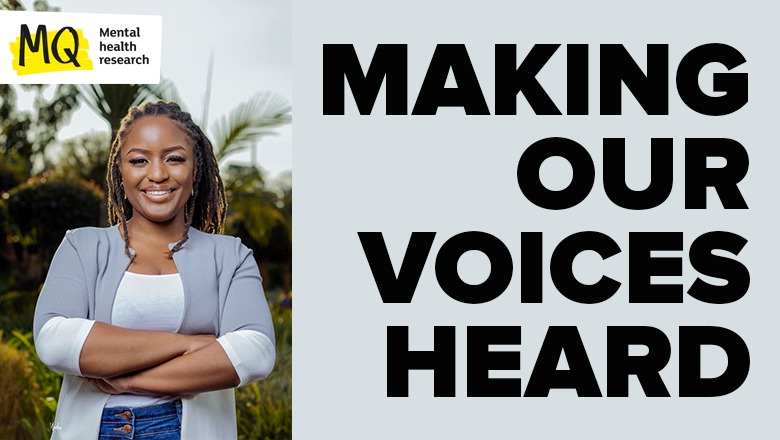Tanatswa Chikarua, founder of the Ndinewe Foundation, a mental health organisation in Zimbabwe, is currently pursuing an MPhil in Basic and Translational Neuroscience at the University of Cambridge. In this insightful blog, Tanatswa explains the value of listening to those with mental health conditions in the world of mental health research.
In my native language, Shona, the word Ndinewe translates to “I am with you”. The mission of the Ndinewe Foundation is to support young Zimbabweans’ mental health and wellbeing by focusing on their lived experiences.
I was a part of the Lived Experience Advisory group for the Landscaping International Longitudinal Datasets project. This is a Wellcome-funded project which aimed to identify existing longitudinal datasets around the world that could be used to further research into anxiety, depression, and psychosis.
From stigma to empowerment
Mental health stigma remains one of the leading contributors in promoting mental health inequalities in different communities. Although it is acknowledged that language, cultural differences, and miscommunication can lead to mental health stigma, the degree to which individuals with mental health issues are stigmatized is often underestimated, partly due to the lack of understanding of mental health from different perspectives.
Lack of culturally sensitive mental health education and awareness campaigns feeds into research practices and narratives, contributing to the persistence of the barriers that prevent some communities from receiving effective mental health care or from accessing it.
On the contrary, the word that comes to mind when I think about the Landscaping International Longitudinal Datasets project is empowerment.
Empowerment is the process of gaining strength and self-assurance, particularly in managing one’s life and asserting one’s rights.
I defined empowerment in this context as the process of enabling individuals with lived experience of mental health conditions and their caregivers to recognize and express their mental health needs at a certain time. This is a process that should not be taken for granted, and looking back, I see its potential to transcend from the project to the communities.
In the past, some people have either looked down on or felt sympathy for those who are experiencing mental health issues. Other times, people with lived experience are forced to suffer in silence by the use of derogatory language that reinforces the stigma associated with mental illness. However, the narrative is shifting as a result of the period we are in.
When talking to those who have lived experiences, empowerment takes centre stage rather than pity or shame.
Because of their unique expertise, familiarity with navigating systems, first-hand awareness of mental health difficulties, and ability to mould research in an original and beneficial way, people with lived experience are increasingly acknowledged as agents of change.
A collaborative approach
The inclusion of Lived Experience Advisors in this process was an essential step in advancing one’s understanding of mental health conditions and improving the wellbeing of individuals. The project was remarkable because it addressed both mental health inequalities and inclusion, creating a platform for lived experience individuals from diverse backgrounds to have their voices heard.
A Lived Experience Advisor’s voice is crucial to inclusivity in research practices. Even though it requires bravery to engage, listen, and pay attention to the needs of the people one is co-creating with, simply considering Lived Experience Advisors as research participants restricts the breadth of mental health research. However, these engagements with Lived Experience Advisors as collaborators provide focus and value.
Individuals from different parts of the globe highlighted various barriers to promoting mental wellness such as language, culture, technology, and translational relevance. It was incredible to identify similarities in our differences amongst the group of Lived Experience Advisors.
We may be shaped by different experiences, but this project created a safe space that revealed that our different experiences align with each other.
This revelation has the potential to be transformative in terms of generating and customizing systems of mental health care for people all around the world.
Being a part of the Lived Experience Advisors encouraged learning, understanding, and growth. Through engagements with key stakeholders, the project was intentional about placing the Lived Experience Advisors’ needs at the forefront. This included phrasing complex terminology in a way that would make the research report understandable and accessible to all, as well as incorporating the Lived Experience Advisors’ thoughts in the objectives and impact statements of the project.
Co-production takes the centre stage
My key takeaway from the project is that there is hope.
My introduction to the mental health space was terrifying. The lack of adequate mental health support for people, let alone individualized support, was my main concern. We are living in a time where people feel like “experiments” in bid to identify a personalized treatment plan. Moving from one mental health practitioner to another makes it seem as if mental health researchers are unaware of the needs, desires, and requirements of the populations they are trying to serve.
To achieve Wellcome’s vision where no one is held back by their mental health, co-production takes centre stage.
It was encouraging to co-produce various components of this project as part of the Lived Experience Advisors. Doing so allowed researchers to appreciate different cultures and viewpoints while also promoting empathy, compassion, and understanding.
To ensure that equality, diversity, and inclusion are at the forefront of research projects, every mental health researcher should ask themselves how lived experience may be included into its foundations. Co-creation and co-production are essential to improving diagnosis and support in mental health.
This project proved to me that a person with lived experience is not just a participant but also a collaborator, which is something I believe may have been the missing component all these years.
Many thanks to Tanatswa for this blog post.
Find out more about why research matters in our Research Appreciation Day articles.
Find out more surprising facts about research.
Source link






